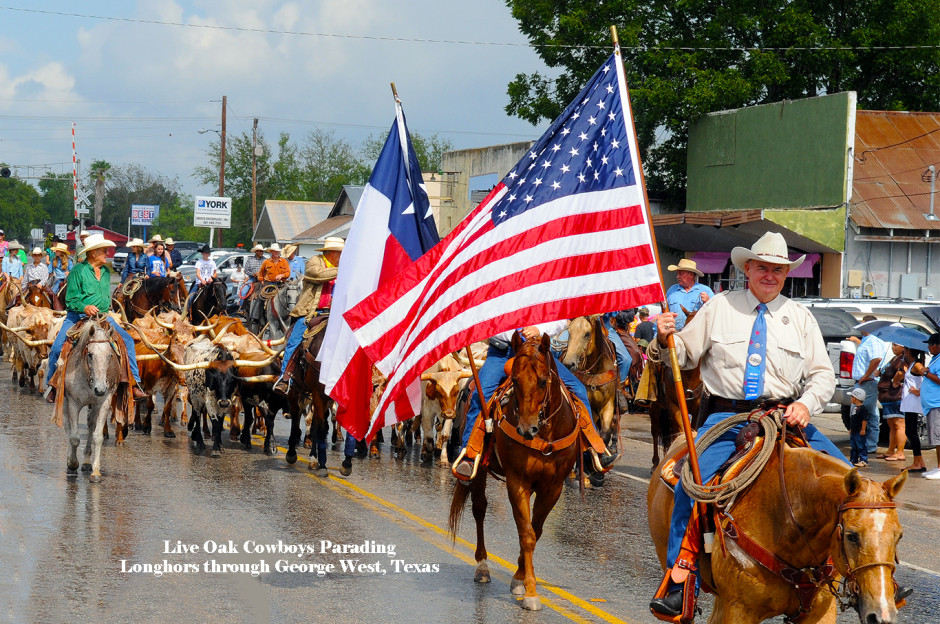
Anna Rose
Anna Rose (aka Annarose), southern Live Oak County, began as small community which developed around a general store, then a post office, and finally a school. Now a ghost town, it sat in the midst of a large farm and ranch area. Anna Rose was also near the small community of Ramirena. Ramirena was named for the earliest settlers in the county around the early 1800's. Marauding Lipan Indians killed many on this family farm and ranch sometime in 1813. Survivors left and never returned to maintain the land which eventually became part of the Texas Republic. (Watch for Ramirena soon.)
Anna Rose is named for Anna Robinson, a local teacher in its early days, and Rose Hyman, stepdaughter of the store owner and postmaster. She followed him as postmaster.
Ranching families in those early days included retired Jesse Robinson, a charter member of Stephen F. Austin's Original Three Hundred emigrants brought to settle Texas. Robinson was also one of Austin's charter group of Texas Rangers. Anna was his granddaughter. Her father was Alfred Robinson. His descendant, David Robinson, wrote a thorough compelling history of the area in his book, A Little Corner of Texas.
Researchers are indebted to Robinson for information he shared of numerous family histories surrounding Anna Rose. His historical rendition of Live Oak's changing topography, economy, and culture are most edifying.
Growing up near Anna Rose during significant world and local culturally changing times of the twentieth century, Robinson discerns that time's values and those that follow. Many Live Oak families still included living predecessors from the 1800's when he was becoming a young man.
An especially intriguing story is Robinson's familial history of rancher, Jim Anderson McCampbell. A past resident of Alabama then living in Goliad County, Texas. Sometime near the end of the Civil War, McCampbell bought 2,000 or more acres of ranchland in southern Live Oak County during the 1800s. This property became his home near the small community of Anna Rose.
Once slaves were freed, McCampbell brought Zella McCampbell, his natural daughter then free, to Goliad. When Zella was of age, McCampbell went back East and asked Tom Weston, African American, Caucasian American, and part Cherokee free man, to come with him to be Zella’s husband.
James McCampbell later brought Tom and Zella's family to Live Oak County where they raised their family on the ranch. They called him Uncle Jim. Tom raised cattle, horses, watermelons, and corn. A school served their children and neighboring children living near Anna Rose. At a later time there were two schools, one black and another for Mexicans and whites. The schools were known as the Anna Rose Common School District. By 1944, it consolidated with George West Independent School District where there was no longer segregation.
In A Little Corner of Texas, David Robinson writes about his friendship with Nob and his brief encounter with Tom Weston before his death.
Sometime after McCampbell’s death, David’s father, Alfred, helped Tom find Judge McCampbell’s will deeding the land to Tom, Zella and heirs as promised. The promise for the property included taking care of McCampbell who was ill for a long time until his death. During Robinson’s visit with Tom much later, David remembers Tom’s speaking warm heartedly about his Cherokee heritage. Robinson says Tom “was well respected – a man of the old school".
Jesse Robinson led quite a colorful life and spent his last years long after Texas won independence with Alfred in Live Oak County near Anna Rose where he lived until he died. Jesse was honored with a Texas Historical Marker at Latham Cemetery by the Live Oak County Historical Commission in 1973.
Three of the six Weston children, Pinkie, Norwick (Nob), and Atlee became renowned throughout Live Oak county. The brothers were known for their knowledge and skill as cowboys and ranch hands. Atlee drowned crossing cattle on the Nueces when it swelled after a rain.
Pinkie married Romano Chapa who was from Mier, Mexico. The marriage of whites (Romano) and mixed whites and blacks (Pinkie) was illegal according to Texas law, but the couple and their family were accepted in Live Oak County. Pinkie was well known for Mexican "bailes" or dances she organized. She spoke fluent Spanish and folks came from far to her dances and held her in “high esteem”. She and Romano ranched about 600 acres they inherited from her parents.
Anna Rose, a lively place at one time, had not only a post office, store, and school but a dance hall and cemetery. A few of Pinkie and Romano's children remained in Anna Rose for some time, but by the next generation, most were gone.
Today, there is little to show except the quaint cemetery with the beautiful old stucco boveda capilla (chapel for the tomb) surrounding the unmarked graves of Zella and Atlee Weston according to the family. Tom, Norwick, Pinkie and Clorinda, the youngest sister, lie in marked graves. Pinkie and one other sister married men named Chapa. Chapa is the name on most of the graves about 12 or more of about only 24 graves.
Hudson, Richard and Janis. Live Oak County, Images of America. Arcadia Publishing, Charleston, South Carolina. 2013. 21.
Robinson, David. A Little Corner of Texas. John Hadden Publishers, Tulsa. 1991. 144-150.
Salinas, Dina, Sherry Kosarek, and Carlynn Hammons. 2020 Weston-Chapa Historic Texas Cemetery Designation filed with the Texas Historical Commission. Austin. 2020.
Sparkman, Ervin L. The People’s History of Live Oak County, Texas. Ide House, Mesquite. 1981. 186-187.
Lindholm, Thelma et. al. The History of the People of Live Oak County, Texas. Self-Published by the Live Oak County Historical Commission, 1982. 9, 25, 27, 28, 33.
